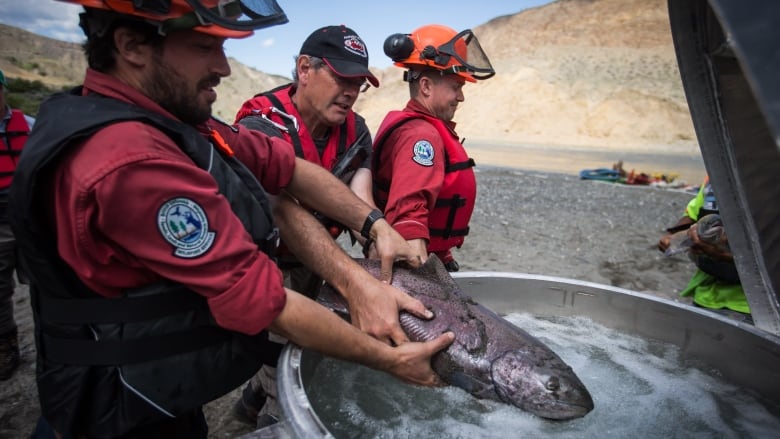First Nations Leadership Council calls for immediate state of emergency over Big Bar landslide
The council is demanding action from the federal and provincial governments

The First Nations Leadership Council (FNLC) is demanding all levels of government declare a state of emergency as communities fear devastating consequences following the Big Bar landslide into the Fraser River north of Lilooet, B.C.
Calling it an urgent matter, council is also asking officialsto remove any remaining obstructions at the site of the landslidewithin the next 60 days.
The call for action comes days after CBC reported federal scientists fearedsome Fraser River salmon populations could be wiped out completelyfollowing the slide.
"I think it requires more political will," said Terry Teegee, B.C. regional chief for the Assembly of First Nations. "We wanted to raise this issue to a high level, to not only the [Department of Fisheries and Oceans] DFO, but to the prime minister and also to high-level people within the provincial government."
The Big Bar landslide created a five-metre waterfall on the Fraser Rivernorth of Lillooetaround October andNovember last year, making it impossible for migrating salmon to push through to their natal streams.
In an attempt to save this year's runs, more than 60,000 fish were captured, stored in tanks, and then lifted past the obstruction by helicopter over the summer. Others managed to swim past after water levels fell.
But despite those efforts, this year's returns are looking grim.

In itsletter, the FNLCalso wants to see a working group put in place that includes representatives from impacted First Nations.
The group would be in charge of monitoring the cleanup efforts, as well as creating contingency plans for those affected.
More calls for action
Last month, the Tsilhqot'inNation declared a state of local emergencyas a result of the slide.
In a letter sent to Jonathan Wilkinson, the minister of fisheries and oceans at the time,Chief Russell Myers Ross said the slide had resulted in a food security crisis for his communities.
Ross claimed the DFO had not conducted the work necessary to mitigate the slide before the next year's salmon runs.
In a statement issuedTuesday, the DFO said it continues to prioritize restoring the fish passage to address what it called a 'conservation crisis" facing B.C.'s salmon population.
It says urgent work will continue over the winter at all levels of government to clear the remaining barrier on the Fraser.
To that end, the federal governmentis also continuinggeological surveys of the area and will do sothroughout the 2020 fish migration season.
Still hopeful
Since the Tsilhqot'in Nation's letter was sent last month, Minister Bernadette Jordan has taken over the portfolio, whichTegeesays gives council hope.
"We've let her know our high-priority issues," Tegee said after meeting with Bernadette. "She told us she would definitely follow up."
CBC News has reached out to the provincial governmentfor comment.
With files from Bethany Lindsay and Pamela McCall












_(720p).jpg)


 OFFICIAL HD MUSIC VIDEO.jpg)
.jpg)



























































































